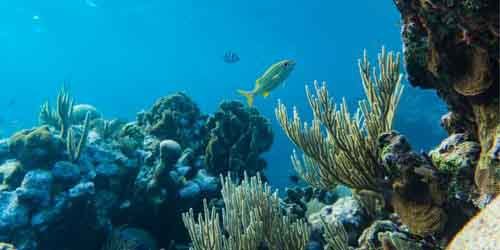
Saba is making significant strides in coral reef restoration through a variety of initiatives. Recently, out of 70 proposals submitted to the Dutch Research Council’s SIA program for applied research, Alwin Hylkema’s ReefGrazer proposal, representing Van Hall Larenstein University of Applied Sciences, ranked first. This project, in collaboration with PES, SCF, Stenapa, Stinapa, VHL University, Wageningen University, and WWF, will receive funding for the next two years.
The ReefGrazer project aims to identify and cultivate new species of native invertebrate grazers to support both reef restoration and fisheries diversification. Key reef grazers, such as sea urchins, whelks, and king crabs, play a crucial role in maintaining coral reef health by consuming algae, which creates more space for coral growth and the settlement of new coral larvae. Some of these species are also edible and considered delicacies. The project will explore the feasibility of cultivating these species for both ecological and commercial purposes.
In addition, the NEPP Saba Coral Restoration plan has been approved by the Ministry of Agriculture, Nature, and Food Quality (LNV). This comprehensive plan, developed in collaboration with the Saba Conservation Foundation, Van Hall Larenstein University, Wageningen University, and PES, aims to enhance the health of Saba’s coral reefs, ensuring vital ecosystem services such as tourism, recreation, and fisheries. Under this plan, the SCF will focus on culturing and outplanting corals, while VHL will concentrate on culturing and restocking sea urchins.
These two research projects are complementary, both working towards the NEPP’s goal of improving coral reef health. Over the past decades, the reefs around Saba have suffered due to various factors including sea urchin diseases, land erosion, and rising sea temperatures linked to climate change. Healthy coral reefs are fundamental to marine biodiversity, providing habitat for a wide range of marine life. Additionally, they act as natural buffers against storms and wave energy, protecting shorelines.
Beyond active restoration efforts, Saba’s Public Entity is also addressing environmental stressors impacting coral reefs. This includes initiatives like reforestation to reduce land erosion, thereby mitigating sediment runoff into the ocean.
Together, these coral restoration projects will enhance our understanding of the factors affecting coral reef health and the measures needed for effective reef restoration. They underscore Saba’s role as a pivotal research hub in marine conservation.
GIS

 Saba News News and Information from Saba Island, Dutch Caribbean
Saba News News and Information from Saba Island, Dutch Caribbean
